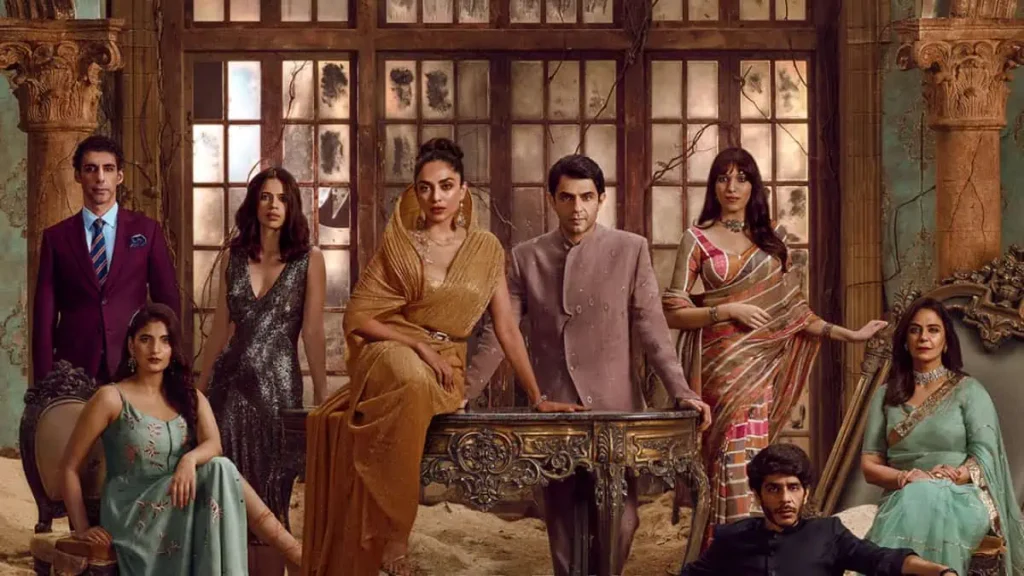The series by Zoya Akhtar and Reema Kagti centered around lavish Indian weddings maintains its instances of sharp societal analysis, yet occasionally meanders off course

Much like the concluding offering of paan and sweetmeat at the conclusion of a lavish wedding in Delhi, every episode of
is incomplete without its closing voiceovers. Specifically, I’m referring to the melancholic subtextual summaries presented by Shashank Arora’s dreamy videographer. “A grim fairytale continues to haunt the capital city of Delhi,” he states an hour into the new season, akin to an opinionated old friend reemerging on social media. “I don’t believe marriages are made in heaven,” he continues around the halfway mark. Though these narrations may be ponderous and apparent, they also serve a purpose, succinctly recapping the episode’s essence in case you happen to lose track of its narrative.
Debuted in 2019 and crafted by Zoya Akhtar and Reema Kagti (with writer-director Alankrita Shrivastava adding a constant third element), the inaugural season of
was a pointed satire on Delhi’s class divisions. Through the tale of two emerging wedding planners, it peeled away layers of traditionalism and conformity entrenched in India’s corporate elite. The season concluded with Tara (Sobhita Dhulipala) and Karan (Arjun Mathur) in turmoil, their ‘Made in Heaven’ agency’s lavish office vandalized and defaced by right-wing extremists. In Season 2, we rejoin Tara and Karan six months later, with Jauhari-ji (Vijay Raaz), now an active partner in their venture, helping them recover. Mona Singh joins the cast as a pragmatic auditor, as well as Jauhari’s wife, infusing the initial episodes with a delirious screwball energy. “You ordered three large burgers?” she mockingly jests with Jaspreet, also known as Jazz (Shivani Raghuvanshi). “With fries too?”
Even as Tara and Karan land ‘big-fish’ clients and gradually find their footing, their personal lives weigh heavily. Karan, haunted by past traumas related to his sexuality, is being emotionally manipulated by his homophobic mother (who’s battling cancer and rejecting chemotherapy). This pushes him into a downward spiral; he relapses into gambling, amasses debts, and succumbs to substance use. Meanwhile, Tara is divorcing her industrialist husband Adil (Jim Sarbh) after he rekindles an affair with childhood friend Faiza (Kalki Koechlin). Encouraged by her mother (the wonderfully portrayed Manini Mishra), Tara decides to demand a more substantial share of the settlement, rejecting the meager terms.
Each of the seven-hour-long episodes revolves around one or two weddings, magnifying specific conflicts. The first season of
had addressed—and in some instances, tackled head-on—topics like dowry, age discrimination, superstition, and sexual assault. This time, it introduces colorism, caste bias, polygamy, and domestic violence to the list. While there are instances of pointed social critique; for instance, the domestic violence episode concludes in a manner that is both unsettling and revealing about the dynamics of abuse. However, there are also storylines that meander or lead nowhere, like a particularly muddled interlude in France.
In the fifth episode, helmed by Neeraj Ghaywan, Pallavi (Radhika Apte), a lawyer and author educated at an Ivy League institution, who openly asserts her Dalit identity, returns from New York for her wedding. She seeks a court marriage; when the in-laws insist on a traditional ceremony, she demands a Dalit wedding as well. This episode is the most challenging and confrontational in the series; when told by her partner that she’s being “paranoid,” Pallavi opens a newspaper filled with upper-caste matrimonial advertisements. Radhika Apte’s performance exudes the assertiveness of a Ghaywan heroine—think Richa Chadha in
, Konkona Sen Sharma in
—yet the episode, while impactful and thought-provoking, lacks the complexity and visual artistry of the director’s previous works.
However, as the episodic rhythm becomes repetitive,
allows more space for its secondary and tertiary characters. Adil’s half-sister emerges, staking her claim much like Tara. Jauhari’s school-going elder son becomes embroiled in a police investigation, likely inspired by the ‘Bois Locker Room’ scandal in Delhi. Transgender doctor-turned-actor Trinetra Haldar Gummaraju makes a memorable debut in a commendable role; after a few introductory scenes that lay down gender sensitization basics, her character takes her own unique shape. I found myself yearning for more of Koechlin, though—one of our finest actors, often relegated to the sidelines.
Dhulipala’s presence somewhat gets overshadowed by the intricate narrative density. Her multi-layered and empathetic depiction of a socially upward mobile female entrepreneur—representative of the East Delhi girl who underwent grooming classes and polished her English to fit in—stood out in the first season. However, here, amidst legal battles and pressures, she has limited opportunities to shine. Tara, Adil, and Faiza aren’t as compelling as rivaling factions as they were when entangled in a messy trio. Mathur remains consistently dependable, holding onto Karan’s tenderness, dignity, and humor. Raghuvanshi also showcases genuine growth in Jazz’s character. The series boasts a plethora of guest appearances, reminiscent of a Farah Khan musical; you can choose between Sanjay Kapoor exclaiming “What a place! What a place!” and Anurag Kashyap attempting to appear serious about casting Pulkit Samrat in a movie.
“Same-sex marriage isn’t legal in India,” a person being interviewed informs Arora’s camera. “They will be,” another assures, nodding. As the series unfolds, it will be intriguing to observe how this optimism aligns with ground realities… and how soon. Akhtar and Kagti have crafted a kind and progressive series in
. Let’s hope it doesn’t end up being seen as merely wishful thinking.”
